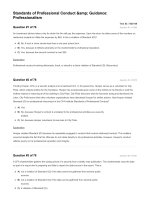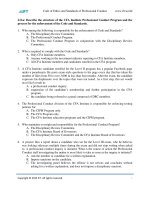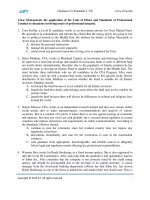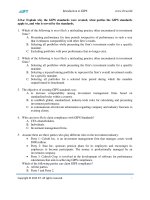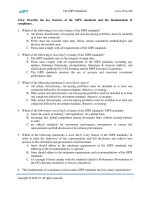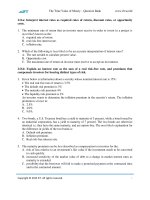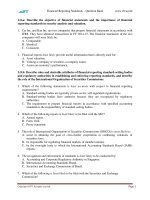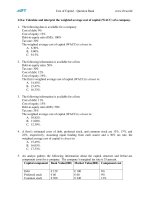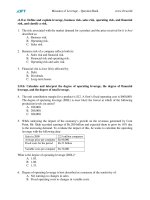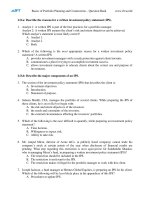CFA 2018 quest bank 02 standards of professional guidance professionalism
Bạn đang xem bản rút gọn của tài liệu. Xem và tải ngay bản đầy đủ của tài liệu tại đây (171.11 KB, 20 trang )
Standards of Professional Conduct & Guidance:
Professionalism
Test ID: 7293275
Question #1 of 53
Question ID: 412288
CFA Institute believes:
ᅞ A) that a maximum level of professional responsibility and conduct dictates that members be
aware of and comply with laws, rules, and regulations governing their conduct.
ᅞ B) that firms should comply with all domestic laws and regulations and that these laws also
govern behavior in foreign markets, regardless of foreign laws and requirements.
ᅚ C) that a minimum level of professional responsibility and conduct dictates that members be
aware of and comply with laws, rules, and regulations governing their conduct.
Explanation
CFA Institute's Code and Standards dictate a minimum level of conduct. Standards should not be based on ethics of upper management
and the board of directors of a company. Firms must comply with the strictest applicable standards, whether they be foreign or domestic
laws and regulations.
Question #2 of 53
Question ID: 412289
Kenny Barrett, CFA, is working in the Australian office of American Investments Co. From an informal conversation, Barrett
learns that the company's most recent investment report was based on misappropriated information. No one at the Australian
office expresses concern, however, because there has been no breach of Australian law. Barrett should:
ᅞ A) disassociate himself from the case with a written report to his supervisor.
ᅞ B) do nothing because the branch is outside of U.S. jurisdiction.
ᅚ C) seek advice from company counsel to determine appropriate action.
Explanation
Kenny's best choice is to seek the company counsel's advice. If Kenny does nothing, he is breaching Standard I(A) Knowledge
of the Law. Disassociation is not enough.
Question #3 of 53
Question ID: 412290
For an employee with the CFA designation who works for a firm, which of the following is NOT necessary to meet the requirements of the
Code and Standards?
ᅞ A) It is recommended that their employer is aware of the Code and Standards.
ᅞ B) Recommend notifying their employer of their responsibility to follow the Code and Standards.
ᅚ C) Deliver a copy of the Code and Standards to their employer.
Explanation
It is no longer required but recommended that CFA members and candidates notify their employer that they are required to
follow the Code and Standards.
Question #4 of 53
Question ID: 412293
If a CFA Institute member knows that a fellow employee has violated a law, according to Standard I(A) the member:
ᅚ A) should seek advice from the firm's legal counsel or a compliance officer.
ᅞ B) is required to report the employee violating the law to the appropriate governmental
authority.
ᅞ C) is required to report the employee violating the law to the appropriate supervisor in the
firm.
Explanation
The most appropriate action is to seek advice about the potential violation. Standard I(A) does not require a CFA Institute
member to report potential violations by others.
Question #5 of 53
Question ID: 412294
The SEC's new stock-trading rule has just gone into effect. The SEC will give brokers a 10-day grace period, during which
violators of the rule will be immediately notified and given a chance to remedy their situation to comply with the new rule. If a
CFA Institute member unknowingly violates the rule and then remedies the situation within the 10-day grace period, has the
member violated Standard I(A)?
ᅞ A) No, because the member unknowingly broke the rule.
ᅞ B) No, because the member remedied the situation.
ᅚ C) Yes, because the member did not maintain knowledge and know of the rule.
Explanation
Standard I(A) explicitly says that a member shall maintain knowledge and comply with laws, rules, and regulations. By not
knowing of the rule, the member broke the standard. If a CFA Institute member accidentally breaks a rule from a careless
error and remedies the situation, this would not be a violation of Standard I(A).
Question #6 of 53
Question ID: 412296
A CFA Institute member is also a member and the portfolio manager of an environmentalist group. In its charter, the environmentalist
group lists a group of companies its members should boycott. The CFA Institute member would violate Standard I(A) concerning obeying
all rules and regulations if the member:
ᅞ A) actively protests against a publicly traded firm boycotted by the group.
ᅞ B) performs either of the activities listed here.
ᅚ C) purchases stock of a boycotted firm for the group's portfolio.
Explanation
Standard I(A) says the member must be guided by all applicable rules and regulations of professional associations governing the
member's professional activities. Purchasing the stock for the firm would be a violation because it involves the member's professional
activities and the rules of a group to which the member belongs and works for. Actively protesting would not be covered by that standard.
Question #7 of 53
Question ID: 412297
Allen Parsons, a CFA candidate, suspects a colleague at his firm of engaging in an illegal activity. Which of the following
statements about procedures for compliance involving Standard I(A), Knowledge of the law is NOT correct? Parsons:
ᅞ A) should urge his firm to attempt to persuade the perpetrator to cease such conduct.
ᅚ B) is required to report this legal violation to the appropriate governmental or regulatory
organizations.
ᅞ C) should consult counsel to determine whether the conduct is, in fact, illegal.
Explanation
Standard I(A), Knowledge of the law, does not require that Parsons report legal violations to the appropriate governmental or
regulatory organizations, but such disclosures may be appropriate under certain circumstances.
Question #8 of 53
Question ID: 412298
Michael Bellow, CFA, CAIA, is an investment banker who is involved with an initial public offering (IPO) of NewCo. Because this
is Bellow's first involvement in an IPO, he reports to an experienced supervisor. While reviewing past financial statements
provided by NewCo, Bellow suspects that NewCo deliberately overstated its earnings for the past several quarters. Bellow
seeks the advice of his firm's highly competent general counsel and follows the advice given without deviation. Based on the
general counsel's advice, Bellow consults his immediate supervisor about the suspected overstatement of earnings. After
reviewing the situation, Bellow's supervisor explains why NewCo's calculations of its earnings are correct. Bellow realizes that
his inexperience and exuberance initially led him to an incorrect conclusion about NewCo's earnings.
Which of the following statements about Bellow's actions involving Standard I(A), Knowledge of the law, and Standard I(C),
Misrepresentation, is CORRECT? Bellow:
ᅞ A) violated Standard I(A) but did not violate Standard I(C).
ᅚ B) did not violate either Standard I(A) or Standard I(C).
ᅞ C) violated both Standard I(A) and Standard I(C).
Explanation
Bellow did not violate Standard I(A), Knowledge of the law, because he sought advice of counsel and followed that advice.
Bellow did not violate Standard I(C), Misrepresentation, because he made reasonable and diligent efforts to ensure the
accuracy of the information and to avoid any material representation.
Question #9 of 53
Question ID: 412299
Robe Advisory Services operates an office in San Francisco, where it manages portfolios for its clients based in the United
States. The firm also maintains an office in Tokyo, where it employs Sam Lee, CFA who researches Japanese stocks.
According to the CFA Institute Standards of Professional Conduct, Lee is required to maintain knowledge of and comply with
all applicable laws, rules, and regulations in:
ᅞ A) both the U.S. and Japan, but not the CFA Institute Standards of Professional Conduct.
ᅚ B) both the U.S. and Japan and the CFA Institute Standards of Professional Conduct.
ᅞ C) Japan, but not the U.S., and the CFA Institute Standards of Professional Conduct.
Explanation
To abide by the Standards, employees who work for foreign-based firms are required to apply the stricter of the foreign (here,
U.S.) law, the domestic (here, Japanese) law, or CFA Institute standards.
Question #10 of 53
Question ID: 412300
Sometimes a CFA Institute member simply feels a law has been violated by his firm, and sometimes the member knows a law has been
violated. Which of the following pairs of guidelines is CORRECT with respect to the first step a member should take in each case? The
member should first contact:
ᅞ A) his supervisor in the firm if he feels a law has been violated and contact the firm's counsel if
he knows a law has been violated.
ᅞ B) the firm's counsel if he feels a law has been violated and the SEC if he knows a law has been
violated.
ᅚ C) the firm's counsel if he feels a law has been violated and contact his supervisor if he knows a
law has been violated.
Explanation
Standard I(A) says that when a member feels a law has been broken, the member should seek advice from the firm's counsel. If the
member feels the advice is unbiased and competent, the member should follow it. If the member knows a law has been violated, the
member should contact a supervisor.
Question #11 of 53
Question ID: 412301
Bob Blanford, CFA, is an investment analyst for a large global brokerage firm. He recently moved to Ragatan, a developing
country with few securities laws and regulations. As part of conducting a company analysis, Blanford interviews Ravi Shanti,
vice-president of finance at Starr Industries. Starr is a major industrial firm in Ragatan and a client at Blanford's firm. Based on
his analysis, Blanford suspects that Shanti may have deliberately overstated Starr's current earnings and its earnings for the
past several quarters. If this information becomes public, Blanford believes that Starr's stock price will drop substantially.
Blanford suspects that Shanti may have violated Ragatan's securities laws. Which of the following statements is least likely to
comply with Standard I, Professionalism? Blanford should:
ᅞ A) determine the legality of the activity, possibly by consulting counsel.
ᅞ B) disassociate himself from the client, if the activity is illegal or unethical.
ᅚ C) take no action.
Explanation
Because Blanford suspects Shanti of engaging in ongoing illegal activities, Blanford should take action by determining the
legality of the suspected action, disassociating from any illegal activity, and urging his firm to attempt to persuade Shanti to
cease such conduct if such an activity is illegal or unethical.
Question #12 of 53
Question ID: 412302
Shortly after becoming employed by Valco & Co., an investment banking firm, Stan McDowell, CFA, learns that most of Valco's
initial public offerings (IPO) are really effected in order to profit management via price manipulation of the shares. McDowell
observes an illegal act, sanctioned by senior management, in progress and refuses to sign off on his responsibility. Instead,
McDowell takes the documentation to his supervisor and tells him he should sign it in his place. This action is:
ᅚ A) a violation of the Code and Standards since he is required not to knowingly participate
or assist in such an act.
ᅞ B) a suitable reaction, and he is in compliance with the Code and Standards.
ᅞ C) an overreaction. Senior management's sanctioning of the act absolves McDowell from
his ordinary responsibility as a CFA Institute member.
Explanation
McDowell, by his action in taking the documentation to his supervisor, is knowingly participating in and/or assisting in an illegal
act. This is clearly prohibited under Standard I(A), and he is in violation of the Standard.
Question #13 of 53
Question ID: 412310
Janet Green, CFA, provides investment advice and other services to clients in several countries. She resides in Country A
whose securities laws and regulations are less strict than the Code and Standards. She also conducts business with clients in
Country B, which has no securities laws or regulations, and in Country C, which has securities laws and regulations that are
stricter than the Code and Standards. Which of the following statements is CORRECT? According to CFA Institute Standards
of Professional Conduct, Green must adhere to the Code and Standards in:
ᅞ A) Country A but the law in Country B and Country C.
ᅞ B) Country A, Country B, and Country C.
ᅚ C) Country A and Country B but the law in Country C.
Explanation
Green needs to follow Standard I(A) -- Knowledge of the law. In Country A, Green must adhere to the Code and Standards
because Country A's laws are less strict. In Country B, Green must also adheres to the Code and Standards because Country
B has no securities laws. Because Country C's applicable law is stricter than the requirements of the Code and Standards,
Green must adhere to the laws of Country C.
Question #14 of 53
Question ID: 412313
A CFA Institute member conscientiously maintains records of changes in security regulations. The member notices that his colleagues do
not, and does NOT say anything. Is this a violation of Standard I(A)?
ᅞ A) Yes, and the member should disassociate from these colleagues.
ᅚ B) Yes, because the member is bound by the Code of Ethics.
ᅞ C) No, as long as the colleagues do not violate the new rules.
Explanation
The last bullet point of the Code says that a member shall "Maintain and improve their professional competence and strive to maintain
and improve the competence of other investment professionals." Ignoring the neglect of rule changes of others would clearly be
incongruent with this component. As long as the colleagues do not violate the laws, the member does not have to disassociate himself
from the colleagues.
Question #15 of 53
Question ID: 412314
Maria Valdes, CFA, is an analyst for Venture Investments in the country of Newamerica, which has laws prohibiting the acceptance of
any gift from a vendor if the gift exceeds US $250. Valdes has evidence that her Venture Investments colleague, Ernesto Martinez, CFA,
has been receiving gifts from vendors in excess of US $250.
Valdes is obligated to:
ᅞ A) disassociate herself from the activity, urge Venture to persuade Martinez to cease the
activity, and inform CFA Institute and regulatory authorities of the violation.
ᅚ B) disassociate herself from the activity, and urge Venture to persuade Martinez to cease the
activity.
ᅞ C) disassociate herself from the activity, urge Venture to persuade Martinez to cease the
activity, and inform CFA Institute of the violation.
Explanation
Standard I(A), Knowledge of the Law requires members who have knowledge of colleagues engaging in illegal activities to disassociate
from the activity and urge their firms to persuade the individual to cease such activity. Reporting to regulatory authorities may be prudent
in certain circumstances, but is not required. Reporting to CFA Institute is not required.
Question #16 of 53
Question ID: 412315
A CFA Institute member works for Secure Securities, Inc., and plays rugby on the firm's rugby team. Secure Securities' team
recently played the team of a rival firm. During the game, a fight broke out and the CFA Institute member was the instigator,
but no one was seriously hurt. Is this a violation of I(A) concerning maintaining knowledge and complying with laws, rules, and
regulations?
ᅞ A) Yes, because the member is bound by the Code of Ethics.
ᅚ B) No, because a fight at a rugby game is not a professional activity.
ᅞ C) Yes, because the member could have hurt someone in the fight.
Explanation
Standard I(A) covers members' professional activity only. Violations outside professional activity that involve fraud, theft or
deceit would potentially be violations.
Question #17 of 53
Question ID: 412316
Nicholas Brynne, CFA, is a fixed-income analyst who trades in mortgage-backed securities (MBS). The MBS industry has seen
sweeping regulatory changes since Brynne took his current position, and he now feels his understanding of applicable laws
and regulatory standards is dated. Brynne must:
ᅞ A) have all trades reviewed by his compliance department until he has obtained an
expert level of knowledge in compliance.
ᅚ B) update his understanding of applicable laws and regulatory standards relating to his
position.
ᅞ C) rely on his firm's policies and procedures for guidance on legal and regulatory
standards.
Explanation
See Standard I(A) "Knowledge of the Law." Brynne should update his understanding of applicable laws and regulatory
standards relating to his position, although he is not required to be an expert in compliance. Relying only on firm policies and
procedures is not sufficient.
Question #18 of 53
Question ID: 412320
Jane Dawson, CFA, an analyst at a New York brokerage firm, suspects that Bob Boatman, CFA, another analyst at the same firm, has
violated a state securities law. According to the CFA Institute Standards of Professional Conduct, Dawson is:
ᅚ A) NOT required to report the violation to the appropriate governmental or regulatory
organizations.
ᅞ B) required to report the suspected violation to CFA Institute.
ᅞ C) required to report the suspected violation to the appropriate state regulatory agency.
Explanation
The Code and Standards do not require that members report legal violations to the appropriate governmental or regulatory organizations,
but such disclosure may be prudent in certain circumstances. Dawson should consult legal counsel and disassociate from the activity.
Question #19 of 53
Question ID: 412321
The CFA Institute Standards of Practice Handbook requires CFA Institute members to do all the following EXCEPT:
ᅞ A) to inform employer, clients, and potential clients of benefits received for
recommending products or services.
ᅞ B) receive written permission from both their employer and outside clients to engage in
investment consulting outside the firm.
ᅚ C) to disclose in writing to the proper regulatory authority all observed violations of the
securities laws and regulations.
Explanation
Members are not required to report violations of others to regulatory authorities, either verbally or in writing, but such reporting
may be prudent.
Question #20 of 53
Question ID: 412322
WEB, an investment-banking firm, is the principal underwriter for MTEX's upcoming debenture issue. Wendy Berry, CFA, an analyst with
WEB, has found out from an employee in MTEX's programming department that a serious glitch was recently discovered in the software
program of their major new product line. In fact, the glitch is so bad that most of their orders have been canceled. Berry checked the
debenture's prospectus and found no mention of this development. The red herring prospectus has already been distributed. Berry's best
course of action is to:
ᅚ A) inform her immediate supervisor at WEB of her discovery.
ᅞ B) keep quiet since this is material non-public inside information.
ᅞ C) notify potential investors of the omission on a fair and equitable basis.
Explanation
Berry should report this information only to her immediate supervisor. Subsequently, she and her supervisor may consult with legal
counsel concerning the competing issues in this situation. For the present, she should avoid disclosure to colleagues who do not need to
know the information and she should also avoid disclosure to clients.
Question #21 of 53
Question ID: 412323
If an analyst suspects a client or a colleague of planning or engaging in ongoing illegal activities, which of the statements about
the actions that the analyst should take is most correct? According to the CFA Institute Standards of Professional Conduct, the
analyst should:
ᅞ A) consult counsel to determine the legality of the activity.
ᅚ B) consult counsel to determine the legality of the activity and disassociate from any
illegal or unethical activity if the member has reasonable grounds to believe that the
activity is illegal or unethical.
ᅞ C) disassociate from any illegal or unethical activity if the member has reasonable
grounds to believe that the activity is illegal or unethical.
Explanation
According to the procedures for compliance involving Standard I(A), CFA Institute members should determine legality and
disassociate from any illegal or unethical activity.
Question #22 of 53
Question ID: 412326
According to the CFA Institute Standards of Professional Conduct, Standard I(A), Knowledge of the Law, members shall not knowingly
participate or assist in any violations of laws, rules, or regulations. An analyst:
ᅚ A) is held responsible for participating in illegal acts when the law is evident to anyone knowing
the law and can participate in a violation by having knowledge of the violation and taking no
action to stop it or disassociate from it.
ᅞ B) must report all legal violations to the proper regulatory commission and is held responsible for
participating in illegal acts when the law is evident to anyone knowing the law.
ᅞ C) is held responsible for participating in illegal acts when the law is evident to anyone knowing
the law and is held responsible for violations by others when the analyst is unaware of the
facts giving rise to the violation.
Explanation
If you suspect someone is planning or engaging in illegal activities, you should:
1. Determine the legality of the activities. Consult your supervisor and legal counsel.
2. Take appropriate action. Disassociate, attempt to persuade the perpetrator to stop. CFA Institute does not require you to report them
to the authorities, but the law might.
Question #23 of 53
Question ID: 412327
Deloris Johnson, CFA, suspected that her intern, who was working without pay at her brokerage firm, had violated a federal securities
regulation. Johnson discussed the matter with her company's legal counsel who said that the intern's conduct was illegal. According to the
CFA Institute Code and Standards of Professional Conduct, Johnson can dissociate herself from this illegal activity by:
ᅞ A) telling her intern to stop such conduct.
ᅞ B) transferring supervision of the intern to another person.
ᅚ C) reporting the activity to the appropriate authorities.
Explanation
Johnson can dissociate herself from the illegal activity by reporting the activity to the appropriate authorities. However, the Code and
Standards do not require that she report legal violations to the appropriate governmental or regulatory organizations, but such disclose is
prudent in this circumstance.
By transferring the intern to another supervisor this may not solve the problem of the illegal activity occurring and the company would still
be held liable for it.
Question #24 of 53
Question ID: 412329
Joshua Rosenberg, CFA, is an equity analyst who covers Northwest Implements, a farm implement manufacturer. Northwest's main
factory is located in a sparsely inhabited region six hours by automobile from the nearest airport. Northwest has its own corporate jet and
a landing strip is located near the facility. When Rosenberg contacts Northwest's management to gather information for a report he is
preparing on the company, Northwest's chief financial officer, Thomas Blake, invites Rosenberg to visit Northwest's headquarters and
meet with management. Blake offers to send Northwest's corporate jet to pick up Rosenberg from an airport near Rosenberg's home and
to return him home the same evening. Rosenberg estimates that it would require three days for him to make the visit using commercial
travel. If Rosenberg accepts Blake's offer and makes the trip to Northwest's headquarters on the corporate jet, Rosenberg:
ᅞ A) has violated the Code and Standards unless he discloses the trip and the payment of his
travel expenses in his report on Northwest.
ᅚ B) has not violated the Code and Standards.
ᅞ C) has violated the Code and Standards unless he reimburses Northwest for the cost of the trip.
Explanation
Standard I(B) requires members to maintain independence and objectivity. A visit by an analyst to an out-of-the-way site may be paid for
by a client company host as long as the analyst can maintain objectivity. Members should encourage clients to limit the use of corporate
aircraft, but exceptions can be made if transportation would not otherwise be available or would be inefficient.
Question #25 of 53
Question ID: 412331
In order to comply with the CFA Institute Standards, an analyst should:
ᅞ A) use only his own research in making investment recommendations, because anything else
would violate Standard I(B), Independence and Objectivity.
ᅞ B) use only his company's research when making investment recommendations and use outside
research for reports and analysis on stocks.
ᅚ C) use outside research only after verifying its accuracy.
Explanation
Standard I(B), Independence and Objectivity: the analyst is allowed to use outside research only after an insightful review. There are no
restrictions regarding the exclusive use of outside information or in-house information.
Question #26 of 53
Question ID: 412335
An analyst who is a CFA Institute member receives an invitation from a business associate's firm to spend the weekend in a high-quality
resort. In order to abide by the Standards, the analyst should (may):
ᅞ A) refuse the invitation if the associate is from a firm he analyzes for his employer.
ᅞ B) obtain written consent from his supervisor if the offer is contingent on achieving a target
investment return.
ᅚ C) do both of the actions listed here.
Explanation
According to Standard I(B) Independence and Objectivity, the analyst should refuse the invitation if it is from a firm the analyst covers for
his employer. The analyst can accept the invitation if it is from a client but the analyst must get written consent from his employer if the
offer is contingent on future performance, to comply with Standard IV(B) Additional Compensation Arrangements.
Question #27 of 53
Question ID: 412338
An analyst preparing a report needs to cite which of the following?
ᅚ A) A recent quote from the Federal Reserve Chairman.
ᅞ B) Estimates of betas provided by Standard & Poor's.
ᅞ C) The individual who developed a chart from the same firm.
Explanation
Statistics provided by a recognized agency, such as Standard and Poor's, do not need to be cited. Charts, quotes, and algorithms
developed by the firm would need to be cited when they are used but the individual(s) who developed the materials within the firm do not
need to be cited.
Question #28 of 53
Question ID: 412340
According to CFA Institute Standards of Professional Conduct, which of the following statements about the prohibition against plagiarism
is most correct? The prohibition against plagiarism applies to written materials:
ᅞ A) and oral communications only.
ᅚ B) oral communications, and telecommunications.
ᅞ C) only.
Explanation
The prohibition against plagiarism applies to all three areas.
Question #29 of 53
Question ID: 412341
The following information involves two research analysts at a brokerage firm.
Erik Bagenot, CFA, is preparing a research report on Global Enterprises, Inc. In preparing the report, he uses materials from many
sources. For example, he uses factual information published by Standard & Poor's Corporation without acknowledging the source. He
also uses excerpts from a research report prepared by another analyst. Bagenot makes only a slight change in wording for these
excerpts, but acknowledges the source.
Sally Wain, who is currently enrolled in the CFA program, is preparing a research report on Manson Telecommunications. She attends
a conference in which several investment experts provide their views about the future prospects of this company. Wain cites several
quotations from these investment experts in her report without specific reference.
According to CFA Institute Standards of Professional Conduct involving prohibition against plagiarism, which of the following statements
is CORRECT?
ᅚ A) Wain violated the Standards, but Bagenot did not.
ᅞ B) Both Bagenot and Wain violated the Standards.
ᅞ C) Bagenot violated the Standards, but Wain did not.
Explanation
Bagenot complied with Standard I(C), which permits publishing factual information from Standard & Poor's without acknowledgment and
using excerpts with acknowledgment. Wain committed plagiarism because she failed to give specific references for the quotations that
she used.
Question #30 of 53
Question ID: 412342
Which of the following is NOT a form of plagiarism?
ᅞ A) Citing quotations said to be attributable to "leading analysts" or "investment experts" without
specific reference.
ᅚ B) Using factual information published by a recognized financial statistics reporting service
without acknowledgment.
ᅞ C) Presenting statistical forecasts by others with the sources identified but without the qualifying
statements that may have been used by the originator.
Explanation
Members may not generally use material without acknowledging the original source, but an exception is made for factual information
published by recognized financial and statistical reporting services.
Question #31 of 53
Question ID: 412343
Wes Smith, CFA, has been working toward the completion of a Master of Science in Finance. He has passed all the necessary courses
and written the necessary thesis. He still must defend the thesis in one month. Smith's thesis advisor assures him that he will pass the
thesis defense. Smith has new business cards printed with "M.S. in Finance" after his name. This is a violation of:
ᅚ A) none of the Standards if Smith does not make the cards public until after he defends his
thesis and receives his degree.
ᅞ B) Standard I(C), Misrepresentation.
ᅞ C) Standard VII(B), Reference to CFA Institute, the CFA Designation, and the CFA Program.
Explanation
If the cards were distributed today he would be in violation of Standard I(C), Misrepresentation. However, if Smith does not make the
cards public until after he receives the degree, there is no violation.
Question #32 of 53
Question ID: 412344
Sandra Bulow, CFA, is responsible for updating her employing firm's website to include changes in analysis techniques and trading
procedures. She is often very delinquent in making these changes, despite working extensive hours. She is aware clients are using the
website to make investment decisions, and has received complaints from the sales department as the information on the website if often
different from what is presented in sales meetings. Bulow is most likely:
ᅞ A) not in violation of any Standard.
ᅚ B) in violation of Standard I(C) "Misrepresentation."
ᅞ C) in violation of Standard III(B) "Fair Dealing."
Explanation
Bulow is most likely in violation of Standard I(C) "Misrepresentation." The web site information is erroneous, and needs to be updated to
match the firm's current practices.
Question #33 of 53
Question ID: 412348
Marc Randall, CFA, is an investment analyst. During a meeting with a potential client, Randall's boss states that, "You can be sure our
investments will always outperform Treasury Bonds because of our fine research staff members, like Marc." Randall knows that this
statement is:
ᅞ A) not in violation of the Code and Standards.
ᅞ B) a violation of fiduciary duties owed to clients under the Standards.
ᅚ C) a violation of the Standard concerning prohibition against misrepresentation.
Explanation
Under Standard I(C), members are forbidden from guaranteeing a specific rate of return on volatile investments. Therefore, the statement
is in violation of the Standard.
Question #34 of 53
Question ID: 412350
Ellen Miamoto, CFA, is preparing a research report on an employment agency, Temp Help, Inc. She includes in her report:
A copy of a paragraph from a report by the Wall Street research firm of Benson Smith.
A graph Miamoto has modified based on an original graph prepared by Gordon Thompson that was published in the Wall Street
Journal.
A chart of national employment trends that Miamoto created using data from the U.S. government's Bureau of Labor Statistics.
In her report, Miamoto must identify and acknowledge:
ᅞ A) Benson Smith, Gordon Thompson, and the Bureau of Labor Statistics.
ᅚ B) Benson Smith and Gordon Thompson.
ᅞ C) Benson Smith only.
Explanation
Standard I(C) Misrepresentation requires members to acknowledge and identify the author, publisher, or source of material they use in
substantially the same form as the original. The use of Benson Smith's original material and Gordon Thompson's modified material must
be acknowledged. The exception to this requirement is information from recognized financial and statistical reporting services, such as
the government agencies that compile national economic statistics.
Question #35 of 53
Question ID: 412351
A CFA charterholder gathers the closing prices of a security from a widely read publication. The charterholder uses the data as part of a
report she is preparing and fails to report the data source in the report. This is:
ᅚ A) not a violation of Standard I(C) if the data can be gathered from several public sources.
ᅞ B) a violation of Standard I(C).
ᅞ C) not a violation of Standard I(C) if the data cannot be gathered from several public sources.
Explanation
Since the security prices represent factual information that can be verified from several sources, there is no violation. It could have been
a violation had the information been exclusively published by the source.
Question #36 of 53
Question ID: 412355
A money manager works for a full-service brokerage firm. After meeting with a new client and gathering all relevant information, the money
manager says that she thinks her firm can perform all the financial services the new client needs. With respect to Standard I(C),
Misrepresentation, this:
ᅚ A) may not be a violation if the manager's opinion is based upon the factual information gathered.
ᅞ B) may not be a violation if the representation was made orally.
ᅞ C) is a violation because she cannot make statements like this under any circumstances.
Explanation
There is no violation if the opinion is based upon the factual information gathered and the firm's actual capabilities. This is true whether or
not the representation was written, oral, or electronic. None of the other choices are correct.
Question #37 of 53
Question ID: 412363
Nancy Hall, a candidate in the CFA program, is an analyst for a mutual fund. As part of her job she makes company visits to interview
executives. On a recent trip she stayed with her sister instead of at a hotel. In her expenses Hall included a hotel charge of $100, which
was less than the amount allowed by her employer. After receiving a check for her expenses, Hall disclosed to her supervisor that she
had stayed with her sister instead of at a hotel. She also returned the $100 to her employer. According to CFA Institute Standards of
Professional Conduct, which of the following statements best describes Hall's professional conduct?
ᅚ A) Hall engaged in professional misconduct.
ᅞ B) Hall did not engage in professional misconduct because she did not meet all of the
requirements to use the CFA designation.
ᅞ C) Hall did not engage in professional misconduct because she eventually disclosed this
information and returned the $100 to her employer.
Explanation
Hall engaged in professional misconduct because her act involved dishonesty, fraud, and deceit.
Question #38 of 53
Question ID: 412366
A CFA charterholder in a managerial position is in the process of hiring new analysts. If the charterholder conducts background checks on
the job applicants with respect to their character, the charterholder has:
ᅞ A) violated the Code of Ethics by invading the applicants' privacy.
ᅞ B) complied with Standard VII(A) concerning conduct of members and candidates in the CFA
Program.
ᅚ C) complied with Standard I(D) concerning professional misconduct.
Explanation
To avoid potential problems and comply with Standard I(D), employers are encouraged to conduct background checks on potential
employees.
Question #39 of 53
Question ID: 412368
A CFA charterholder is caught shoplifting and is sentenced to nine months in prison. Is this a violation of Standard I(D) Misconduct?
ᅚ A) Yes, because the crime involved stealing.
ᅞ B) No, because the crime does not relate to the investment profession.
ᅞ C) Yes, because the prison sentence is more than six months.
Explanation
Any act involving lying, cheating, stealing, or other dishonest conduct that reflects adversely on the charterholder's professional activities
is a violation of Standard I(D). Although the crime did not relate to the investment profession, it certainly reflected adversely on the
charterholder professionally.
Question #40 of 53
Question ID: 412370
Timothy Hooper, CFA, is a security analyst at an investment firm. In his spare time, Hooper serves as a volunteer for City Pride, which
collects clothes for the homeless. Hooper has occasionally given some of the clothes to his friends or sold the clothes instead of
returning all of the clothing to City Pride. City Pride discovers what he has been doing and dismisses him. Later, City Pride learns that
other volunteer organizations have dismissed Hooper for similar actions. Has Hooper violated Standard I(D) on professional misconduct in
the CFA Institute Standards of Professional Conduct?
ᅚ A) Yes.
ᅞ B) No, because Hooper volunteers his services to City Pride.
ᅞ C) No, because Hooper's conduct is unrelated to his professional activities as a security analyst.
Explanation
Hooper violated Standard I(D) because he repeatedly engaged in conduct that involves dishonest conduct. This violation occurred despite
the fact that his offenses do not relate directly to his professional activities. However, Hooper's conduct reflects poorly on his professional
reputation and integrity.
Question #41 of 53
Question ID: 412371
A CFA charterholder who comes to work intoxicated is:
ᅚ A) in violation of Standard I(D) concerning professional misconduct.
ᅞ B) not in violation of the standards.
ᅞ C) in violation of Standard IV(A) concerning duties to employer.
Explanation
Being intoxicated at work is poor personal behavior. It is a violation of Standard I(D), which covers professional competence and integrity.
Question #42 of 53
Question ID: 442248
All of the following violate Standard I(C), Misrepresentation, EXCEPT:
ᅞ A) copying a proprietary computerized spreadsheet without seeking authorization from the
creators.
ᅞ B) citing quotes attributable to "investment experts" without specific references.
ᅚ C) presenting factual information published by recognized statistical reporting services without
acknowledgment.
Explanation
Standard I(C), Misrepresentation, permits using factual information from recognized financial and statistical reporting services without
acknowledgment.
Question #43 of 53
Question ID: 442249
Which of the following is most likely permitted under Standard I(C), Misrepresentation?
ᅞ A) Using excerpts from reports prepared by others without acknowledgement.
ᅚ B) Including data showing the current government bond yield curve in a report to a client without
stating its source.
ᅞ C) Citing quotes attributed to "investment experts" without specific reference.
Explanation
The government bond yield curve is factual information that is available from many recognized financial or statistical reporting services.
Question #44 of 53
Question ID: 442250
According to CFA Institute Standards of Professional Conduct, which of the following is least likely a form of misrepresentation?
ᅞ A) Presenting statistical estimates of forecasts prepared by others with the source identified, but
without qualifying statements or caveats that may have been used.
ᅞ B) Attibuting specific quotations to "leading analysts" and "investment experts" without specific
reference.
ᅚ C) Using factual information published by recognized financial and statistical reporting services
or similar sources without acknowledgment.
Explanation
Standard I(C) provides that "factual information published by recognized financial and statistical reporting services or similar sources"
may be used without an acknowledgment.
Question #45 of 53
Question ID: 461164
A government committee has concluded that investment company fees should be disclosed to clients each quarter and has proposed new
legislation to require this. Currently, the legal requirement is to report such data annually. In compliance with current legal requirements,
Dolphin Investments discloses its fees annually. Eugene Shin, CFA, Dolphin's compliance officer, learns of the proposed changes but
does not convert Dolphin's reporting to a quarterly basis. Shin's decision not to act:
ᅞ A) is a violation of his duty to employer as defined in the Code and Standards.
ᅚ B) is not a violation of the Code and Standards.
ᅞ C) constitutes professional misconduct as defined in the Code and Standards.
Explanation
The potential change in the law is only a proposal at this stage. There is no violation as long as Dolphin is following the regulations
currently in force.
Question #46 of 53
Question ID: 461165
Georgia Jones, CFA, is an analyst for Johnson, Thomas & Co. She also serves as an outside director for Dewey Manufacturing, Inc. In
the course of her duties, she begins to believe that Dewey's income statement for the most recent period may have been misstated.
Georgia should do all of the following EXCEPT:
ᅞ A) consult with Johnson, Thomas' legal counsel.
ᅚ B) inform the Securities and Exchange Commission.
ᅞ C) consult with Dewey Manufacturing's legal counsel.
Explanation
Jones must pursue her concerns about a possible misstatement, because, if material, it may be misleading to investors. Consistent with
Standard I(A), Jones must not knowingly participate or assist in a regulatory violation. As long as her concerns exist, she must not
validate any financial statements by voting to approve them. In addition she should seek competent legal counsel both at her own firm
and at Dewey Manufacturing. She should not go to regulatory bodies until she has more certainty about the possible misstatement and
has received counsel that she should proceed.
Question #47 of 53
Question ID: 461166
Which of the following statements about the CFA Institute Code and Standards is most accurate? The Code and Standards:
ᅞ A) prohibit members from accepting gifts that create a conflict with their employer's interest.
ᅞ B) require members to persuade the perpetrator to cease illegal activities.
ᅚ C) do not require that members report legal violations to the appropriate governmental or
regulatory organization.
Explanation
The Code and Standards do not require members to report violations to legal authorities, but such disclosure may be prudent or required in
certain circumstances. They do not require members to quit their jobs or to persuade violators to cease illegal activities. They do require
that members report the activities to the appropriate person(s) in their own firm and disassociate themselves from the illegal actions.
Members must obtain written permission to accept gifts that create a conflict with their employer's interest.
Question #48 of 53
Question ID: 461167
Lawrence Kelly is the Chief Investment Officer at a money management company that claims it is in compliance with CFA Institute Soft
Dollar Standards. For the first time, the company has purchased securities in the country of Santa Rosa. He learns that under Santa
Rosen law, one of the company's soft dollar policies is forbidden, yet to conform with the law, Lawrence would have to violate the Soft
Dollar Standards, but not the Standards of Professional Conduct. Lawrence:
ᅚ A) should follow the Santa Rosen Law and can still claim compliance with CFA Institute Soft
Dollar Standards.
ᅞ B) must follow the CFA Institute Soft Dollar Standards, informing the Santa Rosen regulators of
his reasons.
ᅞ C) must follow the Santa Rosen Law and cease claiming compliance with CFA Institute Soft
Dollar Standards.
Explanation
In cases when the Soft Dollar Standards conflict with local law, managers should follow local law and are still in compliance with the
Standards.
Question #49 of 53
Question ID: 461168
According to CFA Institute Standards of Professional Conduct, which of the following is least likely a compliance procedure for
maintaining independence and objectivity in making investment recommendations or taking investment action?
ᅞ A) Create a restricted list so that the firm disseminates only factual information about a
controversial company.
ᅚ B) Maintain files to support investment recommendations.
ᅞ C) Restrict special cost arrangements related to travel.
Explanation
Maintaining files to support investment recommendations is not a compliance procedure for Standard I(B): Independence and Objectivity,
but it is a compliance procedure for Standard V(C): Record Retention.
Question #50 of 53
Question ID: 461169
An analyst has been writing research reports on a company for many years. As part of the analyst's continuing research efforts, the
analyst allows the firm to fly him to the firm's headquarters and put him up in the guest quarters the company has for all corporate visitors.
According to Standard I(B), Independence and Objectivity, this is:
ᅞ A) a violation no matter what the circumstances.
ᅞ B) not a violation under any circumstances.
ᅚ C) a violation if the headquarters are within reasonable driving distance from the analyst's home.
Explanation
If such a trip is "out-of-the-way," payment by the company for the trip is acceptable. If the headquarters are within reasonable driving
distance, the analyst should drive there.
Question #51 of 53
Question ID: 461170
Steve Barton, CFA, used to work for Advisors, Inc. After he left Advisors, Barton developed a new screening methodology for determining
which stocks to include in a portfolio. Barton is on friendly terms with his former colleagues at Advisors and shares his screening
methodology with them. If Advisors uses the screening methodology without notifying Barton, then:
ᅚ A) Advisors has violated Standard I(C), Misrepresentation.
ᅞ B) Barton must assume the responsibility of any client losses.
ᅞ C) Advisors must assume the responsibility of any client losses.
Explanation
According to Standard I(C), if an analyst or firm uses the work of others, they must seek authorization from the creators. Such work
includes algorithms, such as a stock screening methodology.
Question #52 of 53
Question ID: 470996
Mary White, CFA, sits on the board of directors of XYZ Manufacturing, Inc. She discovers that management has knowingly participated in
an activity she knows is illegal. According to the CFA Institute Standards of Professional Conduct, White is least likely to be required to:
ᅚ A) report the violation to the CFA Institute Professional Conduct Program.
ᅞ B) disassociate herself from the activity.
ᅞ C) seek legal advice to determine what actions should be taken.
Explanation
Members are encouraged -- but not required -- to report violations of others. Standard I(A), Knowledge of the Law. Prohibition against
knowingly practicing or assisting in violation of laws, rules, and regulations. If White knows that someone has engaged in a possible illegal
activity, she should: (1) report the finding to the appropriate supervisory person at her firm, (2) if the situation is not remedied,
disassociate herself from the situation, and (3) seek legal advice to see what other actions, such as notifying the proper regulatory
agency, should be taken.
Question #53 of 53
Question ID: 470998
Which of the following actions most likely violates Standard I(D) Misconduct?
ᅞ A) An analyst is arrested for trespassing while participating in an anti-abortion protest.
ᅞ B) A member pursues an employment opportunity with a competing firm, primarily as a means of
securing a salary increase from her current employer.
ᅚ C) A Level I candidate submits a request to her employer for auto travel reimbursement using
inflated mileage totals
Explanation
Any activity that reflects adversely on a member's professional reputation, integrity, or competence is a violation of Standard I(D)
Misconduct. Standard I(D) is generally not intended to extend to legal transgressions resulting from acts of civil disobedience in support of
personal beliefs. A member can pursue an employment opportunity with a competitor as long as the member abides by the Standards
related to Duties to Employers.
